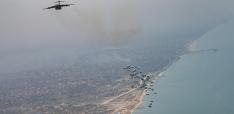Abandon AUKUS: The Case for Independence

Mark Beeson explores how Australia could help to unpick the China-US ‘security dilemma’.
The commitment to the AUKUS pact, with its $368 billion price tag, is the biggest investment ever made by an Australian government in defence or anything else. Even in Australian dollars that’s still a lot of money to spend on a project that has not undergone even the most perfunctory of cost-benefit analyses or feasibility studies.
Unsurprisingly, former prime ministers, senior military leaders and even some members of Canberra’s rather clubby ‘security community’ have been queuing up to draw attention to its manifold potential problems. Top of the list is the very real possibility that the nuclear-powered submarines that are principal rationale for the AUKUS agreement between Australia, the United Kingdom and the United States are increasingly unlikely to ever be delivered.
It is revealing that despite Australia footing the bill for the submarines and paying a non-refundable deposit, it is the United States that is carrying out a review of the project, amid worries about its ability to provide for its own needs, let alone Australia’s. Yet despite mounting evidence about potentially fatal problems, Australia’s policymaking elites remain desperate for AUKUS to proceed.
Not everyone in Australia agrees. On the contrary, public support for the alliance with the US has declined significantly since Donald Trump was re-elected, especially among the young. Two-thirds of the population think there ought to be a parliamentary inquiry into AUKUS. The history of the project explains why that is unlikely to happen.
Born under a bad sign
From its inception, transparency, due diligence and AUKUS were words never seen in the same sentence. On the contrary, the announcement of the pact was preceded by secret negotiations between the three Anglosphere partners. Given that Australia and the UK were represented by Scott Morrison and Boris Johnson, both of whom had questionable political track records and an arms-length relationship with the truth, the absence of careful scrutiny of such a monumental project is remarkable.
It's worth remembering that Australia was already contracted to buy conventional submarines from France, which in addition to being much cheaper than America’s Virginia class alternatives, would have been perfectly adequate for the island-continent’s relatively modest defensive needs—and abilities.
The reason Morrison was so keen to renege on the French deal, however, was not a consequence of a strategic epiphany, but a desire to wedge his political opponents in the run-up to a national election. The chance to paint the Australian Labor Party as ‘weak’ on defence was, Morrison thought, one way of revitalising his plummeting political prospects.
Not only was it revealed that Morrison had lied to the French about his intentions, something President Macron regraded as a ‘stab in the back’, but he was also lying to members of his own cabinet while being secretly sworn into multiple ministries alongside the notional incumbent.
Politics is a tough business, and honesty is clearly not a prerequisite, but Morrison’s record ought to have been a cause for greater caution about endorsing an improbable project without even the most perfunctory of analyses. And yet this is precisely what the leader of the ALP and current prime minster, Anthony Albanese, did.
Albanese has subsequently shown no appetite for changing course, backing away from AUKUS, or developing alternative defence strategies, despite winning a second successive election with a thumping majority.
Baked-in pusillanimity
One of the most striking features of politics in Australia is that the political class is only prepared to support principled, independent policies after they are in a position to do anything about them. Former prime minster ALP Paul Keating describes AUKUS as the ‘worst deal ever’, while former Liberal PM, Malcolm Turnbull rightly frets about the implications for Australia’s sovereignty and independence if the project continues.
And yet towing the party line on strategic issues is a long-standing bilateral tradition. Since the Second World War when the presumed strategic protection of another great power, the UK, was revealed to be a threadbare illusion, Australia’s policymakers have been militarily wedded to the United States.
While the benefits of this alliance relationship are not self-evident, the costs are. Australia’s participation in pointless wars in Vietnam, Iraq and Afghanistan, which were of no strategic consequence to Australia, are the most obvious manifestations of this possibility.
Significantly, when New Zealand dropped out of the ANZUS alliance with Australia and the US because of concerns about hosting nuclear armed American vessels, it had absolutely no discernible impact on its overall security. Indeed, New Zealand demonstrated that it was possible to be an independent middle power without making costly commitments to conflicts, like Iraq, that were best avoided.
Such independence of policy and imagination have never been visible in Australia. On the contrary, policymakers and their advisors still feel more comfortable and reassured when partnering with the US, despite some of the latter’s calamitous strategic decisions.
Given Australia’s perceived status as a predominantly Anglo colonial outpost a long way from its traditional friends and allies in the UK and America, it might have been expected that more thought would have been given to the optics of the AUKUS deal. The idea that Australia would partner with other ‘Anglosphere’ countries rather than its more immediate neighbours is an unfortunate signal from a country seeking acceptance as a genuine regional actor.
Supporting the UK’s improbable desire to start sending gunboats to the ‘Far East’ again looks like folly on the part of both nations, and one certain to irritate China, where memories of ‘colonial bullying’ remain raw. Not content with unfortunate symbolism, however, Australia is intending to literally cement its place at the heart of America’s strategic footprint.
Still a suitable piece of real estate
More than forty years ago, the late Des Ball described Australia as a ‘suitable piece of real estate’. It still is. Indeed, Australia’s place in America’s strategic universe has become even more important over time, a reality generations of Australian policymakers have been keen to reinforce.
The ‘spy base’ at Pine Gap in the Northern Territory is perhaps the most significant of these assets as it allows the US to track missile launches, conduct reconnaissance and targeting activities, as well monitoring the communications of potentially hostile militaries and governments. The Northwest Cape in Western Australia, also provides critical communications for America’s nuclear armed submarine fleet.
Australia also hosts nuclear-capable aircraft at a number of bases, including Tindal in the NT, which also acts as a forward base for a ‘rotational force’ of US Marines. Supporters of the alliance see this as a vital way of ensuring the US retains a presence in the Indo-Pacific, one that guarantees American support in the much-anticipated event of a crisis.
Not content with hosting the most powerful military in the world, however, Australian policymakers are seeking to contribute to America’s strategic effort by providing additional submarines and a dedicated operational and repair facility at HMAS Stirling. Advocates of the move suggest that ‘to call it game-changing would be an understatement’. Given that it will undoubtedly make otherwise peaceful Perth a nuclear target, they may be right about that, at least.
It's perhaps understandable, therefore, that AUKUS supporters also want to establish more ‘decisive leadership’ with the power to compel actions ‘when required’. Given that the local population have not been informed about, much less invited to discuss, the merits of living next door to a nuclear submarine base, forcible acquiescence will probably not be necessary.
But doubts about the alliance relationship are growing in Australia, nevertheless. Not only is the US increasingly seen by the general public as unreliable and a source of international instability, but fears are growing about the possibility of being dragged into yet another war, this time over Taiwan.
Given that Australia’s principal role in previous wars has been to provide a fig leaf of legitimacy for what might otherwise look like an exercise in American unilateralism, there ought to be a debate about just what Australia could or should add in a strategic sense.
Australia having a handful of new submarines, in the increasingly unlikely event that they ever arrive, is never going to make a difference in a great power war between China and the US. But it might make a difference to Australia’s reputation and economy in the meantime.
Opportunity costs and their consequences
It’s possible to make a respectable argument that Australia’s uniquely favourable geographical circumstances—an island continent a long way from trouble spots—makes it easy to defend and gives policymakers enviable freedom of action.
Or possibly not, according to generations of strategic thinkers in Australia, at least. Relations with Southeast Asia remain cautiously functional rather than unambiguously friendly, while dealing with China is a work in progress, despite the obvious benefits that flow from economic interdependence. Seeming too friendly toward Beijing is still seen as something of a liability and evidence of a lack of seriousness when it comes to national security.
While it is possible Australia could get dragged into a conflict over Taiwan if China and the US went to war, it is not possible that Australia could make any difference to the outcome. In the meantime, though, Australia risks damaging its relationship with China and wasting scarce resources that might be put to better uses.
Significantly, Australia and China have one powerful common cause that might be the basis of a much more productive relationship. As the driest continent on Earth, Australia is especially exposed to climate change, even in the form of increasingly powerful and frequent floods; sometimes simultaneously.
Likewise, China’s otherwise remarkable and praiseworthy economic development has come at great cost to the natural environment, one issue about which China’s growing middle class does get agitated about. Given President Trump’s supposed aversion to wars, conflict with China or anyone else remains unlikely, and climate change remains the principal and inadequately addressed threat to both countries future stability and prosperity.
In such circumstances, perhaps it makes sense for Australia to take up Ambassador Xiao Qian’s invitation to ‘join hands’ in cooperating with China over issues of mutual concern. Although Xiao was thinking about American tariffs, which have hurt both China and Australia, the possibilities for useful cooperation over climate change are even greater, as Australia provides coal for Chinese power stations. Both nations could agree to cooperatively move to phase out its use, as an example of what President Xi might describe as win-win diplomacy.
But why stop there? As a more independent actor, Australia could encourage China and the US to cooperate on arms control, upon which they collectively lavish an estimated $1.3 trillion, of which the US spends the lion’s share. It’s not just Australia that suffers from the implacable logic of opportunity costs.
The absence of trust between the great powers creates a ‘security dilemma’ that can never be resolved as both sides become prisoners of an unwinnable, unending and appallingly wasteful struggle for supremacy. Meanwhile the planet burns and millions face disaster.
Perhaps the great powers must operate in what strategists like to think of as the real world, but not everyone does. By abandoning AUKUS and redirecting the savings to more socially useful domestic projects—and even the foreign variety, perhaps—Australia could even set an example of good middle power behaviour. Who knows, it might catch on.
Mark Beeson, Adjunct Professor, Australia-China Relations Institute, University of Technology Sydney.
Photo by Francisco Davids


